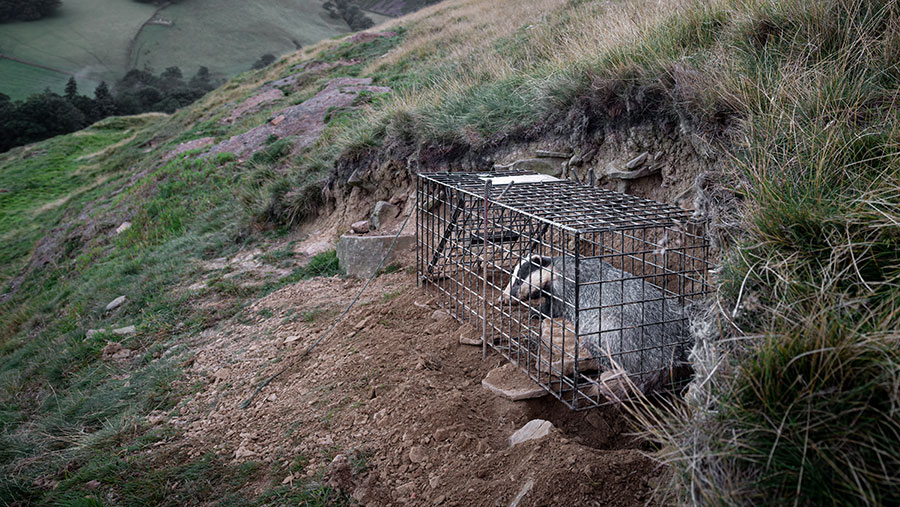Farmer attitudes to bovine TB vaccination mixed, study finds
 © Mike Bryant Photo/Adobe Stock
© Mike Bryant Photo/Adobe Stock Farmers are unwilling to take part in badger vaccination strategies to control bovine TB, a new study has found.
The negative attitude was revealed during research into badger vaccination as part of a Defra-funded project led by the University of Gloucestershire and carried out in collaboration with Cardiff University and Kingshay veterinary group.
The research also looked into cattle vaccination, which produced a more favourable response. Reports were then drawn up for both strategies.
See also: TB cattle vaccine on target for 2025 rollout says chief vet
Badger vaccination
The study canvassed farmer opinion during discussion groups.
Four badger vaccination scenarios were shared with participants so they could discuss which aspects may make vaccination attractive.
These included a government-led approach, a science-led approach, a post-cull approach and a combined approach, whereby cattle and badger vaccination programmes were delivered simultaneously.
But Charlotte-Anne Chivers, lead author of the report on badger vaccination, said farmers were overwhelmingly negative about all four scenarios.
Those quizzed gave several reasons for not wanting to take part in badger vaccination programmes, Dr Chivers said.
First, there were strong concerns about the difficulty of trapping badgers. This view was particularly pronounced in regions that have held culls, as farmers there had direct experience of trapping badgers.
This challenge led to most participants deciding that vaccinating badgers was simply too costly.
Second, there was a lack of clarity around the extent to which vaccinating badgers would result in protection for cattle against bovine TB, Dr Chivers said.
There were also concerns about biosecurity.
While some farmers would allow volunteers onto land, they repeated the importance of protecting livestock from disease.
Farmers also felt they should be able to deliver a cattle vaccine and strategic culling in certain areas alongside badger vaccination to maximise disease control.
Although Dr Chivers admitted farmers did not see badger vaccination as a realistic TB control option, there were steps that could make it more attractive.
First, robust scientific trials should be carried out to build trust in the approach. Second, doses should be provided free of charge, with farmers paid for any time spent on delivery, Dr Chivers said.
Alternative approaches to trapping badgers in an ethical way should also be sought, as most participants felt that the current approach was extremely inefficient.
Finally, farmers should be given more of a voice in the public sphere so they feel more empowered. They have a strong knowledge of bovine TB, but often feel they are not listened to, she added.
Cattle vaccination
In contrast to the negativity surrounding badger vaccination, farmers were generally supportive of a future programme to vaccinate cattle. This was especially true where vaccination did not result in barriers to normal trading.
Damian Maye, lead author of the cattle vaccination report, said farmers were presented with a range of scenarios. This approach allowed the research team to explore how a cattle vaccination programme could be rolled out, said Prof Maye.
The scenarios included: mandatory vaccination, an individual voluntary approach and group-led vaccine programmes.
A mandatory approach was broadly seen as likely to be the most effective. However, if vaccination were to become mandatory, farmers felt it would be unfair to pay towards it, said Prof Maye.
Farmers also argued that they would like to be involved in the design of any policy which rolled out cattle vaccination.
While the discussion groups were generally supportive, they raised several concerns asking for clear information on whether vaccines would reduce bovine TB prevalence, the consequences for trading, the costs of the vaccine including any meat withdrawal period, the Flexibility of vaccination timings and how vaccination status of livestock would be recorded and presented.
Conclusion
Overall, the key recommendation for both strategies is that if Defra and the Welsh government intend to implement any vaccination strategy for controlling bovine TB, there needs to be a strong information campaign beforehand to ensure farmers and stakeholders are willing to participate, Prof Maye said.
